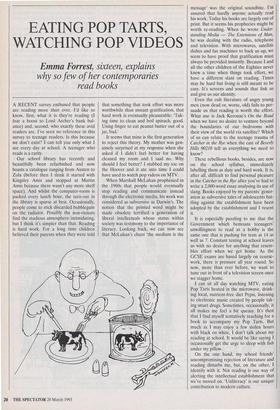EATING POP TARTS, WATCHING POP VIDEOS
Emma Forrest, sixteen, explains
why so few of her contemporaries read books
A RECENT survey enthused that people are reading more than ever. I'd like to know, first, what it is they're reading (I fear a boost to Lord Archer's bank bal- ance) and, second, who exactly these avid readers are. I've seen no reference in this survey to teenage readers. Is this because we don't exist? I can tell you only what I see every day at school. A teenager who reads is a rarity.
Our school library has recently and beautifully been refurbished and now boasts a catalogue ranging from Austen to Zola (before then I think it started with Kingsley Amis and stopped at Martin Amis because there wasn't any more shelf space). And whilst the computer-room is packed every lunch hour, the turn-out in the library is sparse at best. Occasionally, people come to stick discarded bubblegum on the radiator. Possibly the non-visitors find the studious atmosphere intimidating, but I think it's simpler than that. Reading is hard work. For a long time children believed their parents when they were told that something that took effort was more worthwhile than instant gratification, that hard work is eventually pleasurable: 'Tak- ing time to clean and boil spinach, good. Using finger to eat peanut butter out of a jar, bad.'
It seems that mine is the first generation to reject this theory. My mother was gen- uinely surprised at my response when she asked if I didn't feel better for having cleaned my room and I said no. Why should I feel better? I stubbed my toe on the Hoover and it ate into time I could have used to watch pop videos on MTV. When Marshall McLuhan prophesied in the 1960s that people would eventually stop reading and communicate instead through the electronic media, his work was considered as subversive as Darwin's. The notion that the printed word might be made obsolete terrified a generation of liberal intellectuals whose status within society was testimony to the importance of literacy. Looking back, we can now see that McLuhan's chant 'the medium is the
message' was the original soundbite. I'm assured that hardly anyone actually read his work. Today his books are largely out of print. But it seems his prophecies might be worth re-reading. When he wrote Under- standing Media — The Extensions of Man, he was dealing with the radio, telephone and television. With microwaves, satellite dishes and fax machines to back us up, we seem to have proof that gratification must always be provided instantly. Because I and all the other children of the Eighties never knew a time when things took effort, we have a different slant on reading. Times may be hard but living is still meant to be easy. It's screens and sounds that link us and give us our identity.
Even the cult literature of angry young men (now dead or, worse, old) fails to per- suade us that reading is worth the effort. What use is Jack Kerouac's On the Road when we have no desire to venture beyond the boundaries of our bedrooms with their view of the world via satellite? Which of us can relate to the teenage trauma of Catcher in the Rye when the cast of Beverly Hills 90210 tell us everything we need to know?
These rebellious books, besides, are now on the school syllabus, immediately labelling them as duty and hard work. It is, after all, difficult to find personal pleasure in the Catcher in the Rye after you've had to write a 2,000-word essay analysing its use of slang. Books enjoyed by my parents' gener- ation as subversive tales of adolescents bat- tling against the establishment have been adopted by the establishment and I resent it.
It is especially puzzling to me that the Government which bemoans teenagers' unwillingness to read as a hobby is the same one that is pushing for tests at 14 as well as 7. Constant testing at school leaves us with no desire for anything that resem- bles effort when we get home. As the GCSE exams are based largely on course- work, there is pressure all year round. So now, more than ever before, we want to tune out in front of a television screen once we stagger home.
I can sit all day watching MTV, eating Pop Tarts heated in the microwave, drink- ing local, nutrient-free diet Pepsi, listening to electronic music created by people tak- ing smart drugs. Sometimes, occasionally, it all makes me feel a bit queasy. It's then that I find myself tentatively reaching for a book to accompany my Pop Tarts. But much as I may enjoy a few stolen hours with black on white, I don't talk about my reading at school. It would be like saying I occasionally get the urge to sleep with fish under my pillow.
On the one hand, my school friends' uncompromising rejection of literature and reading disturbs me, but, on the other, I identify with it. Not reading is our way of alerting the intellectual establishment that we've moved on. 'Unliteracy' is our unique contribution to modern culture.


























































 Previous page
Previous page